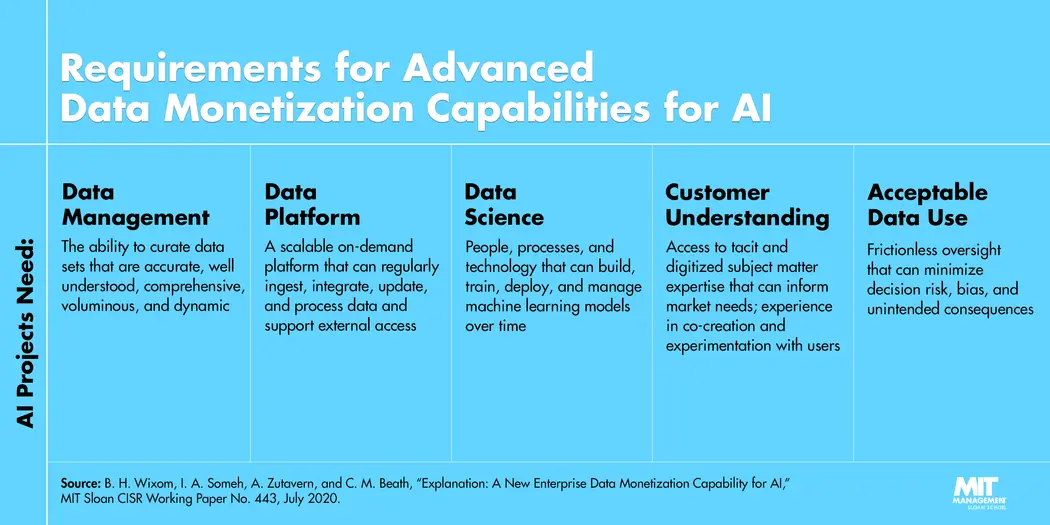Data
5 data monetization tools that help AI initiatives
Having the right data capabilities, like data scientists and a data platform, helps companies build successful artificial intelligence programs.
Successful artificial intelligence programs rely on capabilities that take time to establish. This can make building AI programs seem like a daunting task.
The key is to take an enterprise — rather than local — perspective as AI project teams learn and mature, according to researchers from the MIT Center for Information Systems Research. When companies identify and accumulate expertise and practices from their AI teams, they can create reusable and refinable practices and build capability. This speeds up new AI projects and sets future teams up for success.
Specifically, companies are better equipped for AI programs when they have advanced enterprise data monetization skills in five areas: data science, data management, data platforms, customer understanding, and acceptable data use, according to a new research briefing by Barbara Wixom, Ida Someh, and Cynthia Beath.
The five skills are interdependent, the researchers found, and companies need to develop similar maturity levels in all five areas to be able to generate returns from data.
In particular, the researchers looked at how Microsoft relied on its data capabilities to build a new AI program in 2015. The company’s Real Estate and Facilities group, which was responsible for 190,000 people who worked out of more than 600 buildings, leveraged its data capabilities to build AI programs that reduced building facility costs. The programs would then be deployed within Microsoft and offered to external customers.
Here’s what the five skills looked like at Microsoft:
Data science
The researchers found that companies need advanced data science capabilities, which means the people, processes, and technology to build, train, deploy, and manage machine learning models. At Microsoft, a team of about 20 data scientists helped the Real Estate and Facilities group identify problems that AI could solve, such as using machine learning techniques to understand how space was used and find opportunities for reducing costs. The data scientists developed a model that can be reused for things like building and parking garage optimization.
Data management
To develop AI models, companies need the ability to curate data sets that are accurate, comprehensive, voluminous, dynamic, and well-understood. Microsoft’s project team identified the data needed to train machine learning models, and acquired, cleansed, and validated the data. The data scientists also integrated data about facilities with external data, such as weather information.
Related Articles
Data platforms
Companies need a scalable, on-demand platform like a data lake to serve as a centralized repository. At Microsoft, the team created a data lake to store and analyze data and incentivize internal data sharing. When the company eventually created customer services based on their AI models, they worked on providing data lake access to external users.
Customer understanding
Companies should involve internal and external customers as they train and develop AI models and eventually create products. The Microsoft team discussed results with key stakeholders such as facilities managers and project sponsors to get their perspective. When the AI programs were found to have a potential commercial application, they worked with customers and Microsoft’s consulting team to develop that product.
Acceptable data use
Companies need to establish data protection practices — ideally, frictionless oversight that minimizes decision risk, bias, and unintended consequences. And when data is being used commercially, the data protection practices need to scale up. For example, Microsoft realized that combining data in new ways created the potential to reverse-engineer individual identities, so the team made sure to establish privacy and security practices.
Read next: it’s time to ‘radically escalate’ your commitment to data





